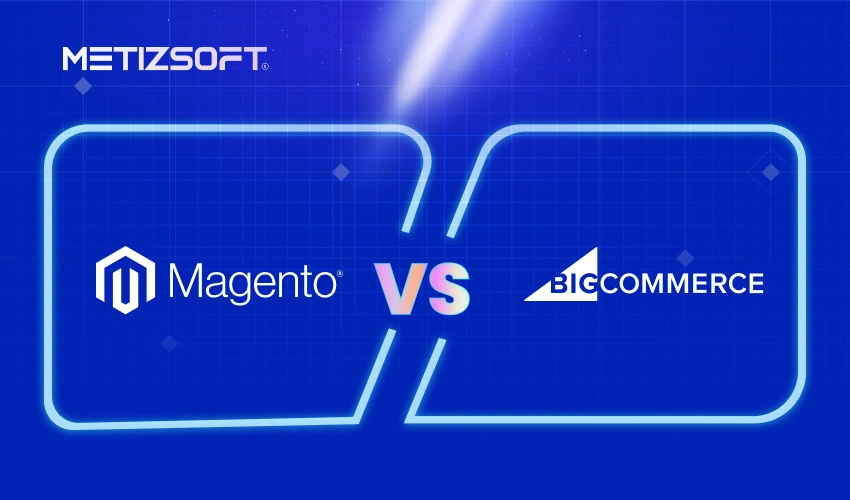
Table of Contents
Summary
Choosing between Magento (now Adobe Commerce) and BigCommerce in 2025 depends on what your business truly needs. If you want complete control and customization and have the tech resources, Magento stands out. But if your goal is a reliable, user-friendly solution that works right out of the box, BigCommerce is hard to beat. Anyway, this blog is designed specifically to help you make the right choice between Magento vs BigCommerce. So, keep reading!
Introduction
The e-commerce world is growing constantly, and 2025 is no exception. With several companies that continue online, the possibility of a reliable e-commerce platform is important to succeed. Choosing between Magento and BigCommerce is not just about features; it is about finding a perfect fit for the eCommerce success journey.
Both platforms have evolved over the years. Magento, now part of Adobe, is known for deep adaptation. On the other hand, BigCommerce is a trendsetter to make selling online easier for everyone. With the construction of your top online store, it is important to make a smart choice between these two to stay longer.
This blog outlines all the crucial details of both platforms, from features to pricing, advantages, and disadvantages. It will help you understand them clearly and make an informed decision between Magento vs BigCommerce!
Magento vs. BigCommerce: Platform Overview
Magento (Adobe Commerce)
It became part of the Adobe family in 2018 and now sits at the heart of the Adobe Experience Cloud. Over the years, it has transformed into a backbone for many big online brands. It operates approximately 131,000 websites worldwide, holding a solid 8% share in the global e-commerce platform market as of late 2024.
If you run a large business and need something truly unique, Magento gives you options. There’s almost nothing it can’t do if you have the right hands at the wheel.
BigCommerce
BigCommerce is an independent, cloud-based SaaS platform. Its focus is to make selling online simple, scalable, and hassle-free for all kinds of businesses. Powering more than 60,000 stores across 150 countries, BigCommerce is popular with growing brands that want a stress-free setup.
If you run a small or mid-sized business that wants quick setup and optimization, then you can use BigCommerce. It comes packed with everything you need, with no technical headaches.
Key Feature Comparison: Magento vs BigCommerce
| Features | Magento (Adobe Commerce) | BigCommerce |
|---|---|---|
| Hosting | Self-hosted or Adobe Cloud | Fully hosted SaaS |
| Customization | Extensive, full code access | Limited, via apps/themes |
| Ease of Use | Steep learning curve | User-friendly, drag-and-drop |
| Seurity | Regular manual updates | Built-in, auto updates |
| Support | Forums & Adobe support | 24/7 customer support |
Pricing Breakdown Between Magento and BigCommerce
Magento
- Open Source: Free to get started, but you’ll need to pay for hosting, security, domain, and most importantly, development.
- Adobe Commerce: Starts at around $24,000 per year, including enterprise-grade features and hosting.
BigCommerce
- Standard Plan: $39/month (Great for new shops.)
- Plus Plan: $105/month (Adds better marketing tools.)
- Pro Plan: $399/month (For larger, growing shops.)
- Enterprise: Custom pricing adjusts with your sales volume.
Performance & Scalability
Magento is built for heavy lifting. If you expect big traffic spikes, lots of products, or have plans to go global, Magento’s architecture can handle it. But you’ll need strong servers and a good technical team behind you.
BigCommerce comes fully hosted and ready for action. It automatically scales up during busy periods, so your site stays fast and reliable without extra work from your side.
Development & Maintenance
With Magento, the sky’s the limit, but you’ll need experienced Magento developers or a trusted Magento development company to keep things running. Ongoing maintenance and updates are part of the deal.
BigCommerce was made to keep things simple. Most features drop right in, and their app store fills the gaps. No need to hire BigCommerce developers, though, a BigCommerce service provider. It can help you unlock its full potential as you grow and develop.
AI & Emerging Trends (2025)
AI is currently revolutionizing the eCommerce landscape.
Magento: Works well with advanced AI integrations, allowing you to build custom experiences or automate nearly anything. Ideal for retailers looking to push the boundaries of AI.
BigCommerce: Has ready-made AI tools! Great for stores that want a taste of AI without complexity. Integration with third-party apps keeps things easy, efficient, and low-maintenance.
Market Trends & Adoption
Magento keeps a strong foothold in the U.S., Germany, the Netherlands, and across Europe. High-end brands and complex stores stick with Magento for its deep flexibility.
BigCommerce has gained popularity in North America and is making strides in the Asia-Pacific region. Mid-sized brands and fast-moving startups love its fast setup and smooth scaling.
Magento vs BigCommerce Pros & Cons Summary
Here’s a closer look at what makes each platform shine, along with its challenges.
Magento
| Pros | Cons |
| Highly customizable! Build a store that matches your vision exactly. | Requires technical expertise! Not a plug-and-play solution. |
| Complete control over hosting, data, and features. | Higher upfront and ongoing costs! Budget for developers and servers. |
| Scales with your business, no matter how big your catalog gets. | Takes time to launch. Setups and upgrades can be lengthy. |
| Robust third-party extension marketplace. Lots of integrations. | Manual security and software updates. Must keep everything up to date. |
| Powerful for multi-store and international setups. | It can be overwhelming. Ideal only if you have the resources to manage it. |
| A strong, supportive community and a wealth of Magento experts. | The initial learning curve is steep for new users. |
BigCommerce
| Pros | Cons |
| Easy to use! Set up and manage your store with a simple, intuitive interface. | Limited in-depth customization, Specific changes may require extra apps. |
| Fully hosted SaaS! No server management or security patching required. | Less control over hosting. BigCommerce controls your environment. |
| Fast to launch. Get online quickly with built-in tools and features | Some advanced features and customizations come at an extra cost. |
| Predictable monthly pricing! Plan your budget with clear packages | More reliant on third-party apps for unique business requirements. |
| Automatically handles updates, backups, and security. | Advanced design changes may still need a developer. |
| Built-in marketing, SEO, and analytics tools for smart growth | Not ideal for truly massive or extremely unique enterprise projects. |
Magento vs BigCommerce: Which Platform is Right for You?
Choosing the right eCommerce platform isn’t about finding the “best” one; it’s about finding the best fit for your business.
Choose Magento (Adobe Commerce) if:
- You need a store that stands out and has a long list of unique requirements.
- You have a developer team in-house or a Magento development company on call.
- Full control over hosting, data, and how your store runs is important to you.
Choose BigCommerce if:
- You want an online store that works from day one and can grow as your sales grow.
- You do not want to get entangled in technical details.
- You are a small or medium-sized business looking for stable, transparent pricing.
End Note: Making the Smart Choice
Both BigCommerce and Magento are leaders in the eCommerce space, but they cater to different crowds. Magento is best for big businesses with bigger plans. It has the resources to back them up. BigCommerce is ideal for businesses looking for convenience, reliability, and growth with minimal fuss.
Either way, your choice today shapes your business tomorrow. If you’re serious about eCommerce success and not sure where to turn, you don’t have to decide alone. At Metizsoft, we know that one size doesn’t fit all in the world of online selling. Our Magento experts and certified BigCommerce developers work with you to understand your needs, recommend the best eCommerce solutions, and handle every detail, from setup to scaling up.
Frequently asked questions (FAQs)
Is Magento better than BigCommerce for large businesses?
Magento is usually the top pick for large businesses that need special features and full control. BigCommerce is ideal for growing or mid-sized companies seeking speed and simplicity.
How much does it cost to use Magento or BigCommerce?
Magento Open Source is free, but it comes with server and development costs. Adobe Commerce starts around $24,000 per year. BigCommerce starts at $39 per month, going up if your business grows.
Do I need to hire a developer for these platforms?
For Magento, yes; it’s a must. For BigCommerce, you can do most things yourself, though a BigCommerce service provider can add value as you scale.
Can both platforms handle international sales?
Absolutely. Both support multi-currency and multilingual facilities. Magento usually provides deep adaptation, while making the BigCommerce setup easier.
Which one is better for SEO?
Both are SEO-friendly and offer strong tools, but Magento allows for advanced SEO tweaks. BigCommerce streamlines SEO with easy settings.
AboutManthan Bhavsar
Related Posts
Recall your Customers by Offering Attractive Discounts in the Upcoming BFCM Sales 2022.
Welcome back to the Shopify BFCM series 2022. Till now we have come up with three episodes to help you prepare for the...
BFCM 2023: Optimize Collection Page with Product Filters!
Welcome to the Shopify BFCM Series 2023! In the last two blogs, we covered the top 10 Shopify apps for the upcoming BFCM sale...

